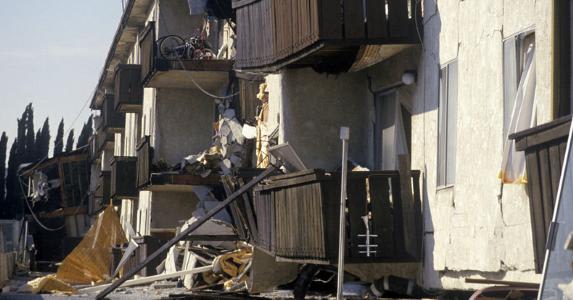An earthquake can shake up your life and devastate your home, but don't let it jolt your finances out of place. You need the right c overage, because your home insurance policy won't be enough.
About 81 percent of the world's biggest earthquakes occur along the Pacific earthquake belt nicknamed the "Ring of Fire," part of which runs up the West Coast from Southern California to Alaska, according to the U.S. Geological Survey. But quakes do happen in other parts of the U.S., such as the earthquake centered in Virginia that damaged the Washington Monument in 2011, and another that same year in Oklahoma, which was the state's largest earthquake in modern times.

The Washington Monument is encased in scaffolding during repairs of damage caused by a 2011 earthquake.
Most U.S. households don't carry insurance to cover earthquake damage. Industry groups say half the losses from the Virginia quake were uninsured, while less than 1 percent of Oklahomans had the proper insurance for a quake.
Even in California, which has the highest earthquake risk in the country, only 12 percent of homes carry earthquake insurance, according to the Insurance Information Institute.
"That's its own disaster waiting to happen," says Glenn Pomeroy, CEO of the California Earthquake Authority, a nonprofit, privately funded insurer set up by the state government.
Here are five things to know about earthquake insurance.
Compare insurance rates in your area.
Get covered!
Conventional homeowners policies don't cover direct damage from earth movement, which includes earthquakes, landslides and sinkholes, says Chris Hackett, director of personal lines policy at the Property Casualty Insurers Association of America. Homeowners wanting earthquake coverage must see if their current insurer offers a rider on their homeowners policy or search for a separate policy altogether.
Earthquake coverage is offered by major insurers including State Farm, Travelers and Liberty Mutual. The Insurance Information Institute reports that the largest writer of earthquake insurance is the California Earthquake Authority, or CEA, created after insurers fled the state following the 1994 earthquake in Northridge that caused more than $15 billion in losses.
View gallery

Northridge earthquake damage
Earthquake insurance premiums could exceed the cost of your homeowners policy in high-risk regions, the CEA's Pomeroy says. Annual coverage rates in California average about $1.75 per $1,000 of coverage, while premiums in lower-risk states can cost as little as 50 cents per $1,000.
Don't settle for a high premium
If the price for earthquake insurance is daunting, there are ways to reduce costs. For example, the CEA offers a 5 percent discount to California residen ts who retrofit their existing homes to make them less prone to shake damage, Pomeroy says. Such improvements include bolting or bracing the structure to the foundation. Homes built after 1979, when stricter building codes were enacted across the state, generally draw lower premiums.
Insurers may offer lower premiums on wood-frame homes versus ones made of brick or masonry, says Hackett. Frame homes typically can withstand shaking better, whereas brick or masonry homes aren't able to flex with the movement and can crack.
Other insurers may lower your premium if you put sprinklers in your home, install metal straps to the walls and roof, or use different trusses, says Jim Whittle, chief claims counsel at the American Insurance Association.
Consider additional coverage
Read an earthquake policy carefully to be sure your belongings are covered, because some quake insurance doesn't cover personal items. If you want to protect your contents, you may need to purc hase a more comprehensive earthquake policy, which will likely cost more.
You may want to consider buying extra earthquake coverage for expensive items, such as fine art or jewelry, on top of the coverage you purchase for your home's more ordinary contents. Similar to regular homeowners policies, earthquake insurance will cover items up to a limit.
"For example, your limit for contents coverage may be $100,000, but on fine art you may have a limit of only $5,000," says Whittle. "That may not be enough for the art you have."
Another type of coverage you might buy as part of an earthquake policy would provide "additional living expenses," money to cover the costs of temporary housing and other basic needs after a disaster.
See if your other policies cover quakes
Apartment dwellers will find their renters insurance is insufficient to cover damage from earthquakes, same as homeowners insurance. Renters who want to insure their belongings against quake dam age will need to scout around for a separate earthquake policy.
Meanwhile, comprehensive auto insurance typically covers vehicle damage incurred in an earthquake, says Whittle. However, not all car owners have comprehensive insurance; many carry only liability insurance, as their states require. That won't do diddly if your car is damaged or destroyed by a quake.
As for other property, check your existing coverage closely. If you have a boat, for example, your marine policy may cover earthquake damage.
Be ready to file a claim
There are a few steps you can take to make filing a claim easier and faster after an earthquake, or any catastrophe.
First -- and this may sound silly -- know who your insurer is. Hackett says many times after a disaster, homeowners can't name their insurance company.
Keep your insurance agent's card in your wallet, or store information about your earthquake insurance and other policies in your cellphone, Whittle suggests. That way, you'll be sure to have it when you need it.
"We don't want to see people getting killed after an earthquake because they go back in a damaged home to get paperwork," says Whittle.
Second, take inventory of everything in your house. Make copies of receipts from appliance purchases and other big items. Take pictures or video of your belongings. Store this list in a safe deposit box or firebox in your home. Trying to remember everything that you had is much harder after a catastrophe. Being prepared ahead of time will speed your recovery.
More From Bankrate.com
- Take our health care poll
- Obamacare and your vote
- Life insurance post-split
- Insurance
- Investing Education
- earthquake insurance
- California
- homeowners insurance






0 comments:
Post a Comment